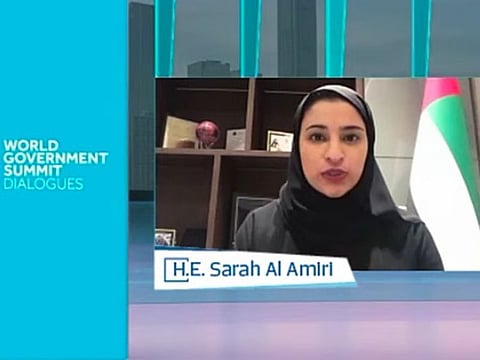UAE to tap private sector to boost country’s space industry
Next step is to transfer knowledge gained from Emirates Mars Mission, Al Amiri says

Dubai: After sending the first Arab spacecraft to Mars, the UAE will engage the private sector to further boost the country’s space industry and diversify the economy, Sarah Al Amiri, Minister of State for Advanced Technology and Chairperson of the UAE Space Agency, said on the final day of the World Government Summit Dialogues in Dubai on Wednesday.
Al Amiri noted that now that the Hope Probe is orbiting Mars and will soon transition to its Science phase, to begin its core mission of studying the atmosphere of the Red Planet, the next step is to transfer the knowledge and experiences gained by the Emirates Mars Mission (EMM) to the private sector.
She said there will be a two-fold approach — the UAE space industry will attract foreign investors and innovators to further enhance capacity-building and at the same time, it will build up the space sector by enabling the private sector.
Attracting the right talent
Al Amiri noted that the UAE is a new entrant in the space industry and it has built a sector that has never existed before. So, “there is a need to attract right talent and create the right environment for the space industry to flourish”.
The UAE has recently announced long-term residency programmes for scientists, researchers and talented students to boost science and technology. Al Amiri also said that there is an urgent requirement to “elevate the demand for space products and services”. At present, the UAE is capitalising on building miniature satellites, including those meant for low-orbital observations, for research and gathering of scientific data.
Solutions to environmental challenges
Incidentally, on Wednesday, Dubai Municipality and Mohammed Bin Rashid Space Centre (MBRSC) announced the launch of DMSat-1, the region’s first environmental nanometric satellite, scheduled for March 20. DMSat-1 will monitor, collect and analyse environmental data as well as measure air pollutants and greenhouse gases. It will also help create maps of the concentration and distribution of greenhouse gases in Dubai and the UAE and study seasonal changes in the presence of these gases.
Also Read: UAE’s Hope Probe moves to science orbit
Data provided by the satellite will be used in several areas, including finding solutions to environmental challenges, developing long-term plans to address urban pollution and climate change and environmental forecasting in Dubai.









